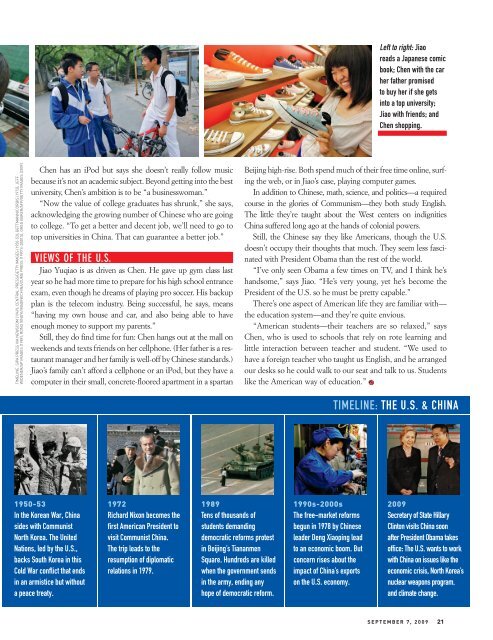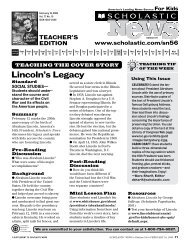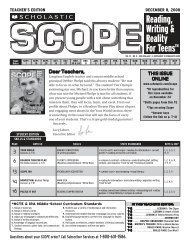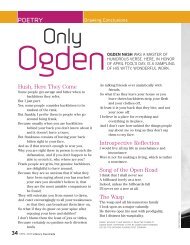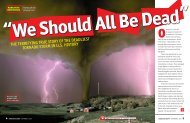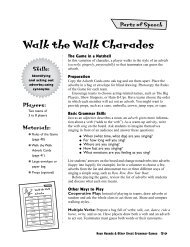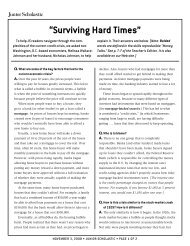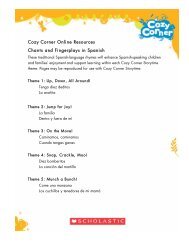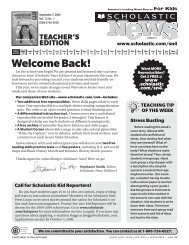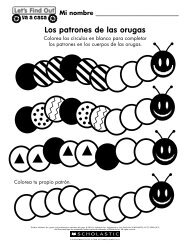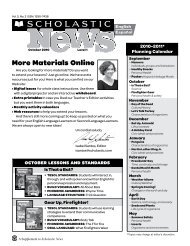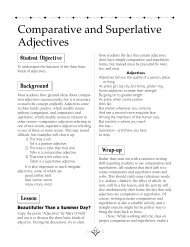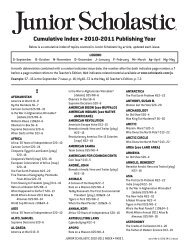3billion - Scholastic
3billion - Scholastic
3billion - Scholastic
Create successful ePaper yourself
Turn your PDF publications into a flip-book with our unique Google optimized e-Paper software.
TIMELINE: SIPA PRESS VIA NEWSCOM (1949); CENTRAL PRESS/GETTY IMAGES (1950-53); BETTMANN/CORBIS (1972); JEFF<br />
WIDENER/AP IMAGES (1989); RONG XINGYI/IMAGINECHINA/ZUMA PRESS (1990’S-2000’S); GREG BAKER/AFP/GETTY IMAGES (2009)<br />
Chen has an iPod but says she doesn’t really follow music<br />
because it’s not an academic subject. Beyond getting into the best<br />
university, Chen’s ambition is to be “a businesswoman.”<br />
“Now the value of college graduates has shrunk,” she says,<br />
acknowledging the growing number of Chinese who are going<br />
to college. “To get a better and decent job, we’ll need to go to<br />
top universities in China. That can guarantee a better job.”<br />
views of the u.s.<br />
Jiao Yuqiao is as driven as Chen. He gave up gym class last<br />
year so he had more time to prepare for his high school entrance<br />
exam, even though he dreams of playing pro soccer. His backup<br />
plan is the telecom industry. Being successful, he says, means<br />
“having my own house and car, and also being able to have<br />
enough money to support my parents.”<br />
Still, they do find time for fun: Chen hangs out at the mall on<br />
weekends and texts friends on her cellphone. (Her father is a restaurant<br />
manager and her family is well-off by Chinese standards.)<br />
Jiao’s family can’t afford a cellphone or an iPod, but they have a<br />
computer in their small, concrete-floored apartment in a spartan<br />
1950-53<br />
In the Korean War, China<br />
sides with Communist<br />
North Korea. The United<br />
Nations, led by the U.S.,<br />
backs South Korea in this<br />
Cold War conflict that ends<br />
in an armistice but without<br />
a peace treaty.<br />
1972<br />
Richard Nixon becomes the<br />
first American President to<br />
visit Communist China.<br />
The trip leads to the<br />
resumption of diplomatic<br />
relations in 1979.<br />
1989<br />
Tens of thousands of<br />
students demanding<br />
democratic reforms protest<br />
in Beijing’s Tiananmen<br />
Square. Hundreds are killed<br />
when the government sends<br />
in the army, ending any<br />
hope of democratic reform.<br />
Left to right: Jiao<br />
reads a Japanese comic<br />
book; Chen with the car<br />
her father promised<br />
to buy her if she gets<br />
into a top university;<br />
Jiao with friends; and<br />
Chen shopping.<br />
Beijing high-rise. Both spend much of their free time online, surfing<br />
the web, or in Jiao’s case, playing computer games.<br />
In addition to Chinese, math, science, and politics—a required<br />
course in the glories of Communism—they both study English.<br />
The little they’re taught about the West centers on indignities<br />
China suffered long ago at the hands of colonial powers.<br />
Still, the Chinese say they like Americans, though the U.S.<br />
doesn’t occupy their thoughts that much. They seem less fascinated<br />
with President Obama than the rest of the world.<br />
“I’ve only seen Obama a few times on TV, and I think he’s<br />
handsome,” says Jiao. “He’s very young, yet he’s become the<br />
President of the U.S. so he must be pretty capable.”<br />
There’s one aspect of American life they are familiar with—<br />
the education system—and they’re quite envious.<br />
“American students—their teachers are so relaxed,” says<br />
Chen, who is used to schools that rely on rote learning and<br />
little interaction between teacher and student. “We used to<br />
have a foreign teacher who taught us English, and he arranged<br />
our desks so he could walk to our seat and talk to us. Students<br />
like the American way of education.”<br />
1990s-2000s<br />
The free-market reforms<br />
begun in 1978 by Chinese<br />
leader Deng Xiaoping lead<br />
to an economic boom. But<br />
concern rises about the<br />
impact of China’s exports<br />
on the U.S. economy.<br />
TIMElINE: THE U.S. & CHINA<br />
2009<br />
Secretary of State Hillary<br />
Clinton visits China soon<br />
after President Obama takes<br />
office: The U.S. wants to work<br />
with China on issues like the<br />
economic crisis, North Korea’s<br />
nuclear weapons program,<br />
and climate change.<br />
September 7, 2009 21


